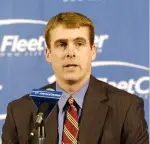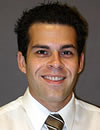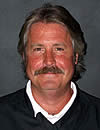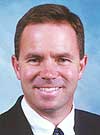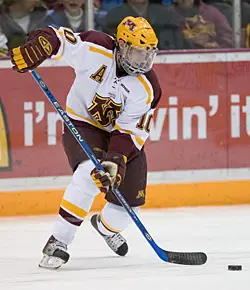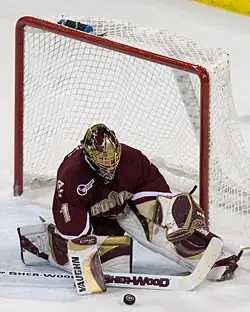The NCAA Men’s and Women’s Ice Hockey Rules Committee determined its intention to use the two-referee, one-linesman officiating system for all levels of play starting in 2008-09 and set its points of emphasis for the coming season during its annual meeting June 5-7 in Indianapolis.
The committee believes a consistent officiating system will enhance training and recruitment efforts for new officials; allow for mentoring; and create consistency for all levels of NCAA competition.
“The committee had thorough and productive discussions with regards to the officiating system used in NCAA Ice Hockey,” said Col. Jim Knowlton, chair of the committee and an administrator at the United States Military Academy. “Through this process, it was determined that the two-referee, one-linesman system was the best fit for the management of the game and the overall development of officials. With some adjustments in the mechanics of the system, we believe this will benefit all levels of play.”
With the two-year rules process implemented with last year’s rules book, the group used its meeting time to discuss its philosophy, consider the current state of the game and to announce its change in officiating system to allow for a gradual implementation process to achieve success.
It was noted that Division III currently uses the two-referee, one-linesman system successfully. It was also determined that, while the one-referee, two assistant referee system theoretically allows for proper penalty calls and line coverage, this system does not provide needed support for assistant referees who call penalties. In fact, assistant referees have been set up for failure by requiring an official to see a penalty and then determine whether or not the referee saw the penalty before deciding to call the infraction.
“What we really like about our game — the increased speed and skill of our student-athletes — also is a detriment when it comes to officiating with one referee,” said Knowlton. “The bottom line is that we need two referees to adequately handle the game as it is currently played.”
The number of linesmen used became the main debate for the committee. Ultimately, when weighing cost factors and possible adjustments to the system, using one linesman became the consensus opinion.
“We realize not everyone will agree with this decision, but our role is to do what is best for the game overall,” Knowlton said. “This system, we feel, is the best system.”
The committee will encourage Division I conferences to use the two-referee, one linesman system during exhibitions, tournaments and other mutually agreed upon opportunities this season in preparation for full-time use in 2008-09. At the Division III level, the committee plans to implement mechanical adjustments that will improve the coverage of lines and the administration of offsides and icing. These changes will be discussed at the supervisor’s meeting this summer and also during pre-season clinics.
The group also spent its time discussing its points of emphasis for the 2007-08 season. The following are the specific areas of the rules book which the committee feels need the attention of coaches, officials and administrators during the upcoming season:
1) Standard of Enforcement. The committee is generally pleased with the overall standard of enforcement, which is intended to allow for the speed and skill of the game to be rewarded. However, the group also believes embellishment is becoming a tactic used to take advantage of stricter enforcement and urges coaches and conferences to address this issue if possible. Additionally, the NCAA standard of enforcement will continue to focus on simplifying the understanding of the standard and encourage a consistent, strict level of enforcement relating to impeding and obstruction fouls that take away a gained advantage.
2) Goalkeeper Freezing the Puck (Rule 4-7-e, Page HR-47). This was a point of emphasis last season with limited success. The committee firmly believes there are too many stoppages granted to goalkeepers when play should continue.
3) Change of Players (Rule 2-5-b, HR-25). The committee believes the line change procedure, which was implemented to speed player changes and limit dead time in the game, has become relaxed in recent seasons. Officials must follow this protocol as listed in the rules book.
4) National anthem (Rule 8-2-e, HR-93). For the image of the game and respect for our nation, the committee asks coaches to instruct players to remain motionless throughout the national anthem(s), just as those in the crowd are asked to be respectful. As a reminder, if a color guard is present, players are to remain on the blue line until the color guard has left the ice surface.
“Overall, the committee’s stance is that the game is in great shape,” Knowlton said. “There are a few areas of concern, however, and we are distributing these to guide our coaches and officials in preparation for the season.”
The issue of tie games was discussed at length at the meeting. The committee considered numerous ideas, including efforts to reduce ties and ways to completely eliminate ties from the game. After these discussions, it is the committee’s current intent to eliminate ties starting with the 2008-09 season.
The group developed the three most feasible options to eliminate ties:
1) Five minutes of 4-on-4 overtime, then decide the game by using a shootout. This option had the most support among committee members.
2) Five minutes of 4-on-4 overtime, then 3-on-3 for five minutes of overtime, then a shootout.
3) Each team would receive a 5-on-4 power play opportunity for two minutes. If Team A scores and then holds Team B from scoring, Team A wins. If Team B scores a shorthanded goal during Team A’s opportunity, the game is over and Team B wins. If a penalty is called on the shorthanded team during the overtime opportunity, the power play opportunity is extended for the additional time. The procedure is used until one team scores. This model is more in line philosophically with the tiebreaking procedures used successfully in NCAA football.
The group also developed the three most feasible options to reduce ties:
1) Five minute overtimes playing 4-on-4.
2) 10 minute overtimes playing 4-on-4.
3) Five minute overtimes playing 4-on-4 and then 3-on-3.
The committee discussed the effect on the Ratings Percentage Index in Division I and the selection criteria for Division III institutions, and will continue discussions with the appropriate championship committees throughout this process. These selection criteria are the purview of the selection committees, not the rules committees.
“At this point, the committee did not take any formal action on tie games, but is presenting several options for consideration throughout the year,” said Knowlton. “We plan to have some resolution on this issue at our meeting next summer.”
The committee also discussed its rules relating to hand passes. Currently, hand passes are allowed by the defensive team in their zone, but everywhere else on the ice, hand passes to a teammate result in a stoppage of play.
The committee believes a change to this rule may be necessary in the future. The group has developed four possible options:
1) Allow hand passes in defensive zone and neutral zone.
2) Allow hand passes anywhere on the ice.
3) Do not allow hand passes at all.
4) No change to the current rule.
“These options are intended to create discussion and thought about this rule, which seems inconsistent to the committee,” Knowlton said.
The committee did take action to clarify the existing rule regarding directing or kicking the puck with the skate. The wording in the rules book uses a “distinct kicking motion” as a determining factor with regard to the puck being kicked or directed. This phrase, however, is not defined in the rules book.
Therefore, the committee added an interpretation for a distinct kicking motion that will be distributed during pre-season clinics and to member institutions. The interpretation shall read: “A distinct kicking motion is defined as the skate moving toward the goal line.”
“This interpretation does not alter any wording that is currently in the rules book, but it is our hope that adding this language in the future will assist officials, coaches and players to understand this rule,” Knowlton said.
In other actions, the committee announced its intention to add a penalty for embellishment in the next rules cycle. A penalty would be called in conjunction with an infraction on the opposing team. The current diving penalty does not appropriately describe the actions that seem to be more prevalent in the game. Currently, diving is a penalty more in line with unsportsmanlike conduct and occurs without a penalty on the opposing team.
The committee also approved several items for consideration and experimentation in the upcoming season. As was the case when discussions were held this year, these future considerations will be the main focus of the committee’s deliberations in 2008.
These considerations are:
1) No personnel changes allowed by the team that ices the puck.
2) Icing no longer allowed when a team is shorthanded, but players are allowed to change.
3) Moving all neutral zone faceoffs to center ice (to penalize offsides more fairly and to have faceoff positions better defined).
4) Stricter enforcement of delay of game penalties when goalkeepers and players fall on the puck to force a whistle.
“We encourage conferences to experiment with these items in exhibition games and scrimmages and report any findings to the committee for consideration at next year’s meeting,” Knowlton said.
Rules Committee Mission Statement
The committee reviewed and confirmed its mission statement, which reads:
“The committee’s purpose is to govern the playing rules of the collegiate game by:
• Acknowledging the traditions and image of the sport;
• Soliciting input from the various college constituencies;
• Examining existing regulations and making necessary modifications to create safe, practical, concise, and enforceable rules; and
• Influencing the long term vision and direction of NCAA Ice Hockey.”
Using this statement as its guiding force, the committee also noted several principles it will use in making future rules changes:
1) Encouraging the speed, skill and integrity of the game.
2) Encouraging more scoring chances in the game, but not necessarily more goals.
3) Eliminating whistles in the game, where possible, and encouraging continuous action.
4) Celebrating the high character and unique brand of ice hockey played at NCAA institutions.
Ty Halpin is the NCAA liaison to the NCAA Men’s and Women’s Ice Hockey Rules Committee.
